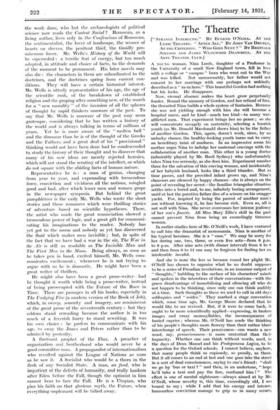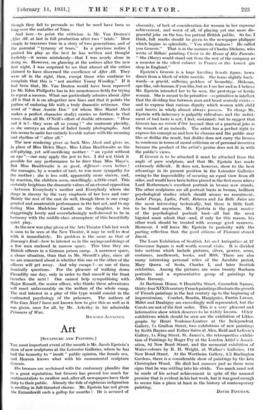The Theatre
f" STRANGE INTERLUDE." BY EUGENE O'NEILL. AT THE LYRIC THEATRE. " AFTER ALL." BY JOHN VAN DRUTEN. AT THE CRITERION. 66 WHO GOES NEXT ? BY REGINALD SIMPSON AND JAMES WEDGWOOD DRAWBELL. AT THE ARTS THEATRE CLUB.] A YOUNG woman, Nina Leeds, daughter of a Professor in the University of a small New England town, fell in love with a college or campus " beau who went out to the War and was killed. Not unreasonably, her father would not consent to her marriage with one perhaps not unkindly described as a " ra-ra hero." This beautiful Gordon had nothing but his looks. He disappears.
Now, eternal absence makes the heart grow perpetually fonder. Round the memory of Gordon, and her refusal of him, the thwarted Nina builds a whole system of fantasies. Because she was not yielding enough with him she will become a hospital nurse, and be kind—much too kind—to many war- afflicted men. That experiment brings her no peace ; so she will concentrate savagely on maternity, selecting a boorish youth (as Mr. Donald Macdonald shows him) to be the father of another Gordon. This, again, doesn't work, since, by an unlucky chance, the healthy-looking youth turns out to carry an hereditary taint of madness. In an impressive scene his mother urges Nina to indulge her maternal cravings with the collaboration of another man. This other is a young doctor (admirably played by Mr. Basil Sydney) who unfortunately takes Nina too seriously, as she does him. Experiment number three for the salvation of this craving woman, and incidentally of her babyish husband, looks like a third blunder. But as time passes, and the provided infant grows up, and Nina's clamours are silenced by happy chances—she is always on the point of revealing her secret—the familiar triangular situation settles into a bored and, to me, infinitely boring arrangement, until at last the putative father dies of a seizure on his swagger yacht. For, inspired by being the parent of another man's son without knowing it, he has become rich. Even so, all is not well with Nina. She never overcomes her intense jealousy of her son's fiancee. All Miss Mary Ellis's skill in the part cannot prevent Nina from being an exceedingly tiresome woman.
In earlier studies here of Mr. O'Neill's work, I have ventured to call him the dramatist of monomania. Nina is another of his typical heroines. She is a " case." We may be sorry for her during one, two, three, or even five acts—from 6 p.m. to 8 p.m. After nine acts (with dinner interval) from 6 to 8 and then from 9 to 11 one may be forgiven for finding her an intolerable invalid.
And she is none the less so because round her plight Mr. O'Neill has chosen to organize what he no doubt supposes to be a series of Freudian revelations, in an immense output of " thoughts," bubbling to the surface of his characters' minds and spoken in the interstices of their conversations—with the grave disadvantage of immobilising and silencing, all who do not happen to be thinking, since only one can think audibly at a time. Such thoughts as these we used to call in old days soliloquies and " asides." They marked a stage convention which, some time ago, Mr. George Moore declared that he would like to see revived. But, if it were to come back, it ought to be more scientifically applied—expressing, in broken images and crazy monosyllables, the inconsequences of buried caprice ; whereas Mr. O'Neill 'has made the thinking of his people's thoughts more flowery than their rather blunt interchange of speech. Their pensiveness—one wants a new word, say, pensaciousness—is more oratorical than their loquacity. Whether one can think without words, used, in the days of Dean Mansel and his Prolegomena Logica, to be a question for the Oxford schools. I cannot believe, anyhow, that many people think so copiously, so prosily, as these. But it all comes to an end at last and one goes into the street in a sort of dual consciousness, saying to one's friend: "shall we go by 'bus or taxi ? " and then, in an undertone, " hope he'll take a taxi and pay the fare, confound him-! " The effect is one of mental nightmare—always aimed at by Mr. O'Neill, whose novelty is, this time, exceedingly old, I am bound to say ; while I add that his energy and intense, humourless conviction manage to grip us in- many scenes, though they fail to persuade us that he need have been so long over the maladies of Nina.
And here—to point the criticism—is Mr. Van Druten's After AU, at last in full production after two " trials." How simply he traverses time in a story of two generations, and of the parental " tyranny of tears." In a previous notice I praised his play as the best he has written and thought foolishly—it seems mistakenly—that I was nearly alone in doing so. However, on glancing at the notices after the new first night, I was surprised to see that almost all the critics claimed to have discerned the excellence of After All. They were all in the right, then, except those who continue to complain that this is " not another Young Woodley." If it had been that, Mr. Van Druten would have been reproved (as Mr. Eden Phillpotts has in his monotonous field) for trying to repeat a success. What one particularly admires about After All is that it is on altogether new lines and that it points the pathos of enduring life with a truly dramatic reticence. One word of " dear Auntie Doe " (of whom Miss Muriel Aked makes a perfect character study) carries us further, in that sense, than all Mr. O'Neill's effort of double utterance. " How sad it is !—they were all so young ! " she murmurs placidly, as she surveys an album of faded family photographs. And this seems to unite her entirely lovable nature with the meaning and rhythm of " after all."
The new rendering gives us back Miss Aked and gives us, in place of Miss Helen Haye, Miss Lilian Braithwaite as the self-pitying, yet self-sacrificing mother " an egoist without an ego "—one may apply the jest to her. I did not think it possible for any performance to be finer than Miss Haye's. But Miss Braithwaite is as good, different—even better ! She manages, by a wonder of tact, to win more sympathy for the mother : she is less cold, apparently more sincere, and, by reaction, the children seem, unwillingly, a little cruel. This certainly heightens the dramatic values of an eternal opposition —between Everybody's mother and Everybody whom she drags in slavery by the very emphasis of her love and care. Mainly the rest of the cast do well, though there is one exag- gerated and amateurish performance in the last act, and to my feeling Miss Madeleine Carroll, as the daughter, is too staggeringly lovely and overwhelmingly well-dressed to be in harmony with the middle-class atmosphere of this beautifully quiet play.
As the new war play given at the Arts Theatre Club last week is soon to be seen at the New Theatre, it may be well to deal with it immediately. Its problem is the same as that of Journey's End—bow to interest us in the sayings and doings of a few men enclosed in narrow space. This time they are British officers in a German prison camp. A narrower space, a closer situation, than that in Mr. Sherriff's play, since all we are concerned about is whether this one or the other of the officers will get away. And why escape ?—as one of them ironically questions. For the pleasure of walking down Piccadilly one day, only in order to find oneself in the front trenches the next ! One cannot help sympathising with Major Russell, the senior officer, who thinks these adventures will react unfavourably on the welfare of the whole camp. The real interest in a play of this type would consist in the contrasted psychology of the prisoners. The authors of Who Goes Next ? have not known how to give this as well as it was given, once for all, by Mr. Ackerley in his admirable Prisoners of War.
RICHARD JENNINGS.
















































 Previous page
Previous page